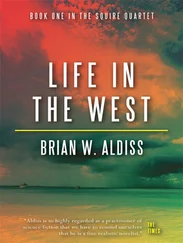Burnell knew from his WACH briefing that Ossetian occupation of this Georgian territory had endured for some while, until the hostility of their Christian neighbours, together with climatic changes, had forced the Muslim Ossetians to seek more hospitable territory to the north. Like the Balkans, Transcaucasia was a patchwork of conflicting ways of life.
A cluster of men, wearing a variety of uniforms, stood under the domed porch. All were armed. They watched alertly as Burnell and James Irving climbed from the Jeep and approached. One of the men took a step forward in order to detach himself from the others.
Burnell’s senses were so roused, by the drinking the previous night in Tbilisi, by the flight over the Caucasus, and by the exhilaration of finding himself in this divided land, that he took in the leader at a gulp. This man, right down to his swagger, was as picturesque as anyone could have wished, his khaki greatcoat being draped about with pistols, magazines, and the traditional Kalashnikov. With his boots and sheepskin hat he made a familiar figure, who appeared regularly on TV news bulletins. This was the rebel, taking advantage of the upheavals in Nagorny-Karabakh, who fought to establish his own breakaway state. He was all the more real to Burnell because the latter had seen him on television.
The leader looked mountainous. It was only later, seeing him less showily equipped, that Burnell realized he was no taller than average.
He gave his visitors a nod and a cold eye.
‘You’re Lazar Kaginovich?’ Irving enquired in his deep voice.
The other drew himself up. ‘I am Captain Lazar Kaginovich. Commander of Armies of the West Georgian Republican Forces.’ His English was accented but fluent. ‘You are of course the brave American Commander Irving, once an astronaut to the Moon. You are welcome in West Georgia.’
‘It’s just James Irving now.’
Kaginovich smiled by the sly expedient of raising his moustached upper lip. His expression did not change as Irving introduced Burnell.
‘Dr Roy Burnell, eh? We received a signal regarding you. But you are not a doctor of medicine.’
‘That’s correct. My subject is ecclesiastical architecture.’
‘There is a war going on and you come to regard a church …’ Kaginovich shrugged his shoulders. ‘Well, that’s understood. We make concessions in time of war. To receive EU aid – to have Commander Irving – we must accept also ecclesiastical architects. Come with me.’ The words provoked his sneer.
A frozen look about Kaginovich made him a century older than his real years. He had yet to reach thirty. Already experience had etched itself on his brow and under his eyes.
The men in the porch gave way for the newcomers, while scrutinizing them mistrustfully. These were Kaginovich’s officers. One, a large man with sandy hair, gave an affable nod in Burnell’s direction. After a suspicious glance, the others returned to gazing across the airstrip, where the Yak’s cargo was being unloaded into the lorry. A distant mortar was still pounding, apparently to little effect.
Kaginovich walked with a slight limp, clapping his right hand to his thigh. Irving followed, with Burnell close behind, humping his gear over one shoulder. The old mosque had been wrenched from its original sacred purpose; it now housed soldiers, animals, and ammunition. A racket of lowbrow music issued from a radio.
The air was greasy with the stink of men, their cooking, their piss, and their mules. A number of West Georgian soldiers lay about on blankets, smoking, indolently watching smoke rise from a fire to cobwebby beams far above their heads. Their weapons and boots lay beside them. In one corner, mules and donkeys were tethered. The mules, black and long-eared, mutiny always in mind, shook their long heads over the backs of the donkeys.
An armoury of weapons, including a small field gun, bombs, and ammunition boxes, was piled carelessly near the fire, on which a cook was stirring a dixie.
Sunlight slanted in from above, rendered cold and fishy-looking by dirty windows. It was a scene more from the nineteenth century than the twenty-first. The end of the Cold War, signalling an uprising of nationalisms and ethnic quarrels, had set the map back to an 1899 disposition.
Tokens of war – of the continuing fragmentation of what had been until little more than fifteen years ago the Soviet Union – were everywhere. A shell hole through the front wall of the mosque had been plugged with sacking. Much of the interior was blackened by fire. Mural quotations from the Koran had been defaced. Wounded men lay on stretchers, tended by a male nurse. The desk to which Lazar Kaginovich strode was piled with papers held down by a clip of grenades.
Burnell thought of an analysis of the woes of the world, heard from a woman’s lips. Had those lips been Stephanie’s? He could not remember. But he remembered the terms. Women had risen up to assert themselves after centuries of oppression. Pride injured by this challenge, men had turned to an ancient proof of manhood, war. An alluring analysis but incorrect: the regions where women remained oppressed, without security or suffrage, were among those most ready to take up arms.
But to accept the aggressive nature of men, and the destructive nature of their creeds, was hardly a diagnosis, Burnell reflected, looking about him with excitement.
Kaginovich threw himself down behind his desk. He gestured to his two visitors to draw up stools. He shouted for the radio to be switched off.
‘I welcome you, Commander Irving. We of course know of your heroic past. We are honoured you have joined the West Georgian Republic’s struggle for independence, and freedom against its oppressors.’ His English contained rich aspirates in the Russian manner. He ignored Burnell.
Irving’s relaxed attitude to life had been demonstrated on the flight from Tbilisi.
Speaking in his easy way, he said, ‘Captain Kaginovich, as you are aware, I am merely on a peace-keeping mission instigated by the EU Security Council. I have nothing to do with the forces of General Stalinbrass, or with the UN blue berets, who were drawn into this struggle when their convoy was ambushed by Azeri forces near Signakhi.’
‘Those Azeris – they’re rebels, murderers, ethnic cleansers!’ Kaginovich said.
‘I’m a fact-finder, Captain. My presence here is designed to work toward a truce between you and your present enemies, so that proper discussions can take place and –’
‘None of discussions! Not until we have regained our stolen territories from here to the sea.’
Irving continued unperturbed. ‘– in Borzhomi, or elsewhere to be agreed. To this end, the EU Security Council will deliver at least a percentage of the aid requested. Dr Burnell and I have flown in with the first instalment.’ From inside his military parka he drew a list of the supplies and handed it across the desk. ‘No arms there, of course.’
‘We can secure arms from Hungary. We have friends, you know.’ Kaginovich grabbed the paper and read hastily down the list. ‘Yes. Not bad. Good. Excellent. We need everything. When can we receive more?’
Jim Irving was a neat wiry man in his sixties, athletic, without a gram of spare fat. His tanned good-natured face with its blue-grey eyes was mid-Western in origin, his white hair cut short. He spoke in a deceptively casual way. ‘You may receive more aid when my mission and Dr Burnell’s are satisfactorily completed. Also when proper courtesy is shown to Dr Burnell. You have our papers and know Dr Burnell to be one of the trustees of World Antiquities and Cultural Heritage. His directive is a simple one, requiring your cooperation: to make a survey of the ancient church of Ghvtismshobeli on Lake Tskavani.’
Burnell said, ‘We understand that the Tskavani region is at present under your jurisdiction. Or have United Georgian forces reclaimed it?’
Читать дальше










